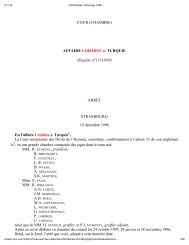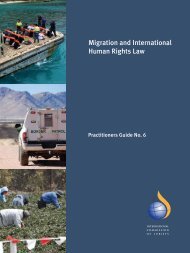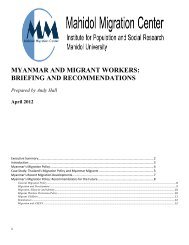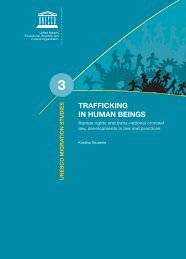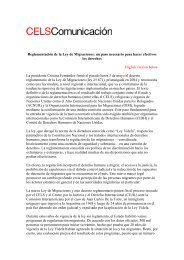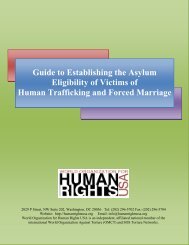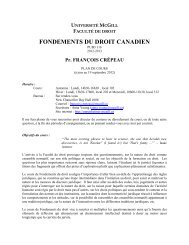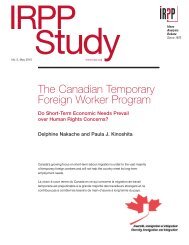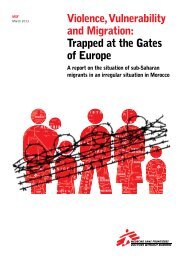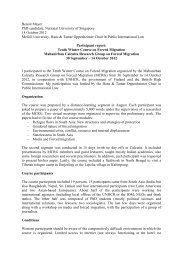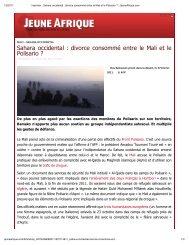Preventive Detention, Suspected Terrorists, and War
Preventive Detention, Suspected Terrorists, and War
Preventive Detention, Suspected Terrorists, and War
You also want an ePaper? Increase the reach of your titles
YUMPU automatically turns print PDFs into web optimized ePapers that Google loves.
COLE FINAL<br />
7/1/2009 12:43 AM<br />
736 CALIFORNIA LAW REVIEW [Vol. 97:693<br />
detention of “enemy combatants” through detailed legislation. The Israeli<br />
Supreme Court upheld Israel’s Internment of Unlawful Combatants Law, which<br />
authorizes detention of individuals who “took part in hostilities against the<br />
State of Israel, whether directly or indirectly,” or who are “member[s] of a<br />
force carrying out hostilities against the State of Israel.” 198 The court<br />
interpreted the law in light of both Israel’s Basic Law <strong>and</strong> the international laws<br />
of war to authorize detention where there has been an individualized<br />
determination that a person meets one of the above categories.<br />
The court noted that in a traditional international armed conflict,<br />
“unlawful combatants” are not treated as “combatants,” a term limited to those<br />
privileged to fight <strong>and</strong> covered by the Third Geneva Convention, but are<br />
instead treated as a subset of “civilians,” protected by the Fourth Geneva<br />
Convention. 199 However, it also noted that the Convention permits detention of<br />
civilians where detention is “absolutely necessary” to the security of the state,<br />
<strong>and</strong> is subject to judicial or administrative review. 200 The court stressed that to<br />
meet the requisite showing of necessity, an individualized determination must<br />
be made, <strong>and</strong> construed the Israeli law to require a showing by “clear <strong>and</strong><br />
convincing evidence” that the individual either (1) took a non-negligible part in<br />
hostilities against Israel, or (2) was a member of an organization engaged in<br />
such hostilities <strong>and</strong> “made a contribution to the cycle of hostilities in its broad<br />
sense.” 201<br />
Moreover, because the justification for detention is preventive, the court<br />
held that periodic review is required to ensure that detention lasts no longer<br />
than absolutely necessary. 202 In addition, the court ruled that as the length of<br />
detention increases, the strength of the evidence that the individual poses a<br />
threat must also increase. 203 Thus, a detention that is marginally justified at its<br />
outset may cease to be justified three months later if the government does not<br />
offer additional evidence that the individual poses a threat. This increasing<br />
evidentiary requirement is predicated on the notion that as detention is<br />
extended, the burden on individual liberty increases, <strong>and</strong> therefore a<br />
proportionally stronger showing is required to warrant further detention. 204<br />
<strong>Detention</strong> may last no longer than is necessary, <strong>and</strong> in no event longer than the<br />
hostilities that triggered it in the first place.<br />
The Israeli Supreme Court’s approach to enemy-combatant detention is<br />
more expansive than Judge Wilkinson’s in two respects. First, it authorizes<br />
198. Id. at 9 (quoting Section 2 of Internment of Unlawful Combatants Law).<br />
199. Id. at 15.<br />
200. Id.<br />
201. Id. at 20.<br />
202. Id. at 44.<br />
203. Id. at 43-44.<br />
204. This is likely to affect only marginal cases, because where the evidence is very strong<br />
at the outset, it is unlikely to be weakened by the passage of time, <strong>and</strong> as long as the showing was<br />
strong to begin with, it will ordinarily suffice to justify an extended detention.



